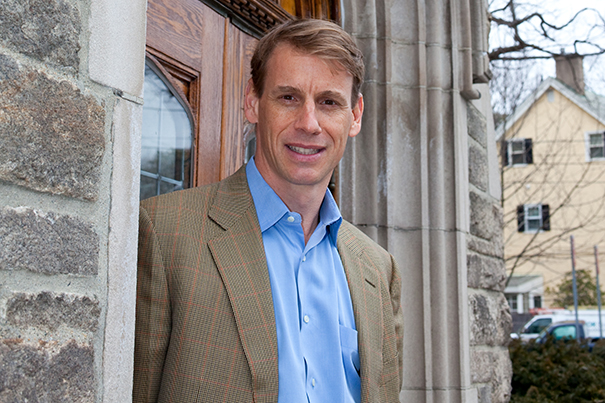
“The human transformation of most of Earth’s natural systems represents a clear and present danger to global health. There’s an enormous amount that can be done to address these threats — that’s why it’s important that we recognize these issues and devote research time and resources to them,” said Samuel Myers, a senior research scientist at the Harvard T.H. Chan School of Public Health, who will direct the project.
Staff file photos
Sick planet, sick people
Harvard Chan School’s Myers to lead new environment and health project
The effects of human activity on the planet go far beyond climate change, say Harvard scientists studying links between human health and the environment. In fact, the role of humans in altering a myriad of natural systems has the potential to halt or even reverse a series of dramatic health gains made in the past half-century.
To better understand the complex picture of what is happening — and respond to it — researchers across disciplines within and outside the University are launching an effort to unite and support scientists working at the intersection of the environment and health.
The Planetary Health Alliance is being formed in partnership with the Wildlife Conservation Society (WCS) and supported by two grants from the Rockefeller Foundation, one to Harvard, of $3.91 million over three years, and one to WCS.

“Increasingly, we have come to recognize that the health of humanity depends on ensuring the health and resilience of our planet — from our climate, to our forests, to the air we breathe and the water we drink,” said Michael Myers, managing director at the Rockefeller Foundation. “The Rockefeller Foundation helped to pioneer the field of public health more than 100 years ago, and today we are proud to support the field building efforts of the new Planetary Health Alliance — which we think of as building ‘public health 2.0.’ ”
Samuel Myers, a senior research scientist at the Harvard T.H. Chan School of Public Health, will direct the project. Harvard Chan School research scientist Christopher Golden will serve as associate director.
“The human transformation of most of Earth’s natural systems represents a clear and present danger to global health. There’s an enormous amount that can be done to address these threats — that’s why it’s important that we recognize these issues and devote research time and resources to them,” said Myers.
The Harvard University Center for the Environment and the Chan School will participate jointly in the alliance.
Center for the Environment Director Daniel Schrag said the interdisciplinary nature of planetary health makes the center — where the alliance will be based — a good home.
“I believe these problems are important,” said Schrag, the Sturgis Hooper Professor of Geology and a professor of environmental science and engineering. “I also really believe that, because of the community we’ve built, there’s almost a unique opportunity to get extraordinary teams of experts working on these issues.”
The study of links between environment and health is nothing new to Myers and Golden. Myers is investigating the health effects of pollution in Southeast Asia caused by humans burning forests to clear land for oil palm plantations. He has also examined how global pollinator declines may impact human health, as well as climate change’s impact on the nutritional value of crops, discovering that higher carbon dioxide levels can reduce iron, zinc, and protein content.
Golden, meanwhile, has trained his eye on the reduced availability of bushmeat in Madagascar, finding that it causes declines in diet quality and increases risks of micronutrient deficiencies. He and Myers pair recently launched an effort to explore how environment-related changes in the status of global fisheries are likely to affect nutrition and health.
Organizers plan to develop the Planetary Health Alliance into a consortium of universities, non-governmental organizations, and other partners.
“The Planetary Health Alliance will help improve our understanding of the health benefits which natural systems are providing to humanity,” said Cristián Samper, president and chief executive officer of the New York-based Wildlife Conservation Society. “WCS has long recognized the need to enhance the understanding of a range of critical conservation-public health connections, and the need to inform both conservation and public health policy.”
The alliance will support the planetary health community in a variety of ways. At Harvard, it will support a new course on the subject, develop a new Web-based textbook, and create a postdoctoral fellowship. It will also develop an online educational platform to include film, slides, and course syllabi.
To foster a broad community, leaders plan monthly e-updates on new research, an online journal club, and an annual meeting of the “planetary health community of practice.”
“The idea is to grow capacity here, to use Harvard’s convening power to create an intellectual community … to create excitement for people currently working in this space,” Schrag said.
Alliance fellows will work across a range of topics, including the impact of environment change on diet and nutrition, changes to disease ecology, human displacement and migration, waterborne illnesses, and mental health.
“We are already seeing suffering due to global environmental change,” Myers said. “How much suffering happens is up to us.”





